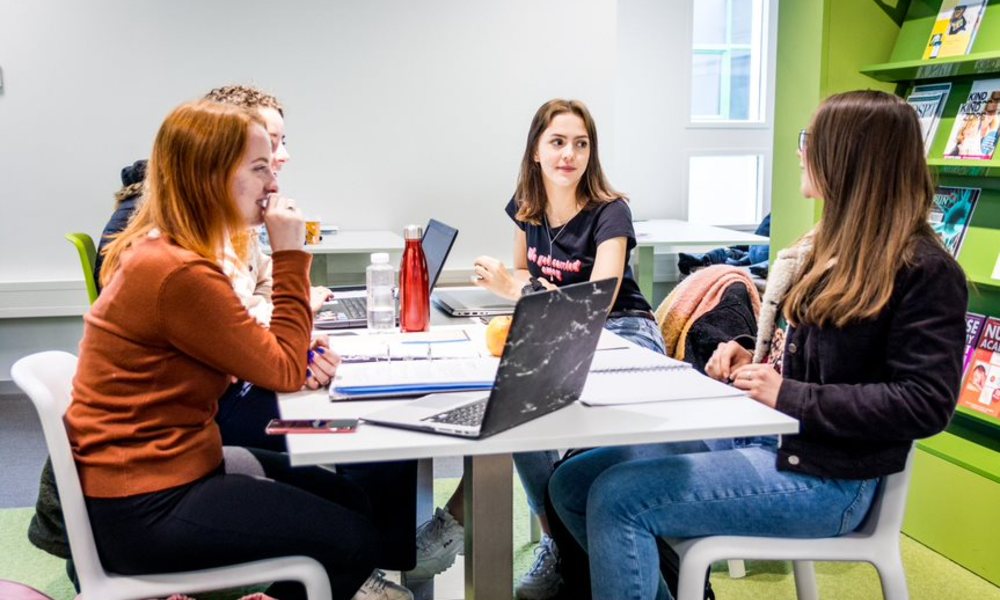Future Health

Future Health
- Level
- Language
- English
- Credits
- 30 ECTS
- Startmonths
- Start: February
- Locations
- Groningen
Are you ready to tackle real-world health challenges and make an impact on a global scale? The Future Health programme is a cutting-edge, interdisciplinary programme designed for ambitious third- and fourth-year bachelor students who want to push boundaries and think outside the box.
About this programme
In this 20-week adventure (30 ECTS), you’ll step into a dynamic international learning environment where collaboration, innovation, and cultural diversity are at the core. Work alongside students from different backgrounds, solve pressing health issues, and explore game-changing fields like epidemiology, sociology, public health, and emerging health technologies.
This semester programme contains 30 credits with the option to only follow the first half of the programme for 15 credits. National and international students are welcome to join the prgramme Future Health!
What makes this programme unique?
- Global focus: Learn how health systems worldwide are shaped by culture, technology, and policy.
- Innovative problem-solving: Use cutting-edge methods to develop impactful solutions.
- Hands-on experience: Engage in project-based learning and gain exposure to real health environments.
- Expert guidance: Learn from top professors, health professionals, and industry leaders.
Your pathway to a future in health
This programme is perfect for students interested in healthcare, public health, health policy, technology innovation, or international development. You'll graduate with both theoretical knowledge and practical experience, ready to make a difference in the world of health.
Module structure
| Semester Period 1 | Semester Period 2 |
| Module 1 - 5 EC Module 2 - 5 EC Module 3 - 5 EC | Module 4 - 5 EC Project - 10 EC |
Full time 30 EC programme
Possibilities: Period 1(15 EC) or Period 1&2 (30 EC)
Optional: Elective Language Course (5 EC)
Module: Tech Driven Wellness
In an increasingly digital world, this module explores the role of technology in addressing healthcare challenges. You'll analyse the opportunities and risks of using healthcare devices and software applications. Collaborate with peers to design and prototype a tech-driven wellness product, and critically evaluate its safety, ethics, and legality. This module equips you with the skills to make a positive impact in your community through sustainable and innovative technological solutions.
Module: Sustainable Future
This module empowers students to champion global sustainable development policies, engage in ethical reflections on health and well-being, and collaborate to eradicate gender discrimination and violence. You'll connect with like-minded individuals, advocate for equality, and contribute to a sustainable and inclusive future in health.
Module: Redefining Ageing
Explore demographic changes and challenge stereotypes about ageing. This module examines the difficulties and opportunities of growing older, with practical research involving semi-structured interviews with seniors. You'll gain a deeper understanding of experiences in later life and develop skills to address issues related to ageing.
Module: Family Health and Wellbeing
Focus on systemic thinking and innovative care practices. This module addresses the rising demand for informal care due to aging populations and healthcare system challenges. You'll explore family systems theory and develop proposals for innovative, evidence-based interventions that enhance patient- and family-centered care.
Project: Health Innovation Lab
Dive deep into a pressing health challenge and develop innovative solutions. This 10EC project involves collaboration in an international and multidisciplinary team, utilizing the design thinking process. You'll identify, understand, and address real-life health issues, culminating in a final product that showcases your creativity and problem-solving skills.
Before you can start
- You are a third-year or fourth-year student (Bachelor level undergraduate or associate degree).
- You have a background in nursing, allied health care studies, midwifery, social studies, human technology studies or sport studies.
- You have completed the first year of your programme and have obtained at least 45 ECTS in the main phase (year 2, 3 (or 4)).
- You have experience in project management and have developed research skills. No general education on these two topics will be offered.
- You will need to work in an international interprofessional multidisciplinary team and have sufficient knowledge of the English language (graduation level secondary school). Useful additional personal characteristics for participation in such a team are: an open mind, the ability to listen actively, tolerance, flexibility, transparency in motives, interests and values.
- Language requirements
Academic IELTS 6.0 overall
How to apply
Check www.hanze.nl/applicationexchange for the application details.
Admission & application
Please check with your home university whether there is an agreement set up with the Hanze School that is offering the exchange programme of your choice. To apply for and be admitted for our exchange programme you should take the following steps
-
1. Be nominated by your home university
Once you have been nominated, your nomination will be checked by us and confirmed to your home university by email. You will receive your application link during our application period.
-
2. Submit your online application
Once you have been nominated by your home university you will receive a personal application link and the application instructions during our application period. The application is fully digital and documents do not have to be send by email or postal mail. Make sure you do not miss our application deadline!
-
3. Letter of Acceptance
Once you have submitted your application we will check your documents. If you have to re-submit any documents, we will let you know. We will be sending out Acceptance Letters from the beginning of May when you start in September and from the middle of October when you start in February.
Find out more about our application process and practical matters.
Frequently Asked Questions
Contact exchange programme Future Health
-
Contact exchange programme Future Health



